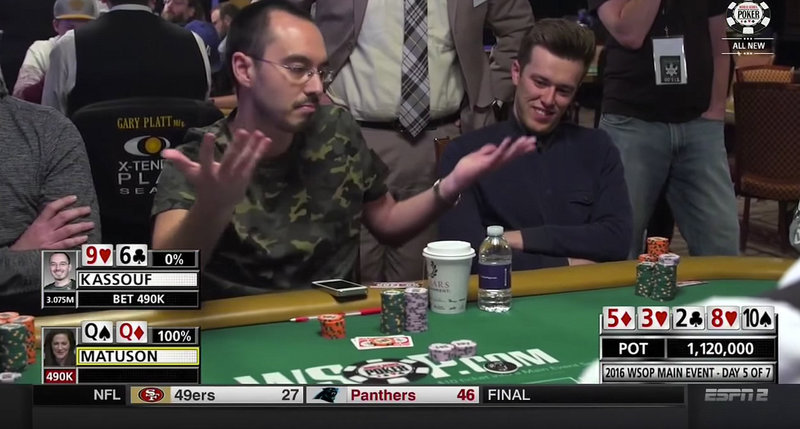






Did Poker Player Go Too Far With Table Talk At WSOP?Was William Kassouf Penalized To Harshly For His Table Talk? |
|
|

On Sunday, Sept. 18 the third and fourth hours of the 2016 World Series of Poker main event television coverage aired on ESPN. The unifying theme of the night seemed to be table talk, as the chatty Alex Keating and William Kassouf were prominently featured throughout each of the episodes. Both players used weaponized wordplay to try to improve their chances in the world’s biggest poker tournament and drew a lot of attention from the cameras as a result.
“Its nice to see some life at the table. This is the main event, have a good time,” said commentator Norman Chad early in the broadcast. “It’s poker folks, it’s supposed to be fun!”
While plenty of players and poker fans might prefer the animated table talk of the two players, there were also plenty of people who did not enjoy the extracurriculars including Stacy Matuson, who played a controversial pot against Kassouf at the beginning of the fourth episode.
The hand arose on day 5 of the main event. With a board of 5 3
3 2
2 8
8 10
10 Kassouf, a former lawyer from the UK, moved all-in having Matuson well covered.
Kassouf, a former lawyer from the UK, moved all-in having Matuson well covered.
Matuson, who held an overpair with the Q Q
Q , was contemplating a call for her tournament life when Kassouf began his routine.
, was contemplating a call for her tournament life when Kassouf began his routine.
“You don’t want to bust out with a whole camera crew watching, yeah? This would be embarrassing," said Kassouf. “You don’t put me on this hand.”
You can watch the episode below. The hand begins at 1:04 into the video.
Matuson was facing a tough decision in it’s own right but one made even harder by the actions of Kassouf. Her frustration showed as she asked floor staff why Kassouf’s hand was still live after he had broken the rules regarding influencing the action of a hand through talking. The pertinent items in the 2016 WSOP Tournament Rules as listed are rules no. 113 and 116, which are listed in full below.
113. Table Talk / Disclosure: participants are obligated to protect the other participants in the Tournament at all times. Therefore, whether
in a hand or not, participants may not:
a. Disclose contents of live or folded hands.
b. Advise or criticize play at any time.
c. Read a hand that hasn’t been tabled.
d. Discuss strategy with an outside source while involved in a hand.
e. The one-participant-to-a-hand rule mentioned in Rule 111 will be enforced.
Special Exceptions:
1. A participant is allowed to mention the strength or content of his/her hand if no other participant in the hand will have a decision to make.
2. In heads-up events or when down to the last two participants in a Tournament, participants may speak freely regarding the contents of their hands.
3. The Floor Person reserves the right use his/her judgment to determine if one participant intentionally helped another participant. Participants who violate this rule are subject to penalty in accordance with Rules 40, 111, and 112.
116. Etiquette Violations: Repeated etiquette violations will result in the imposition of penalties assessed by the Tournament Staff. Examples include, but are not limited to, unnecessarily touching other participants’ cards or chips, body, or clothing, delay of the game, repeatedly acting out of turn, betting out of reach of the dealer, or excessive chatter. Excessive chatter includes, but is not limited to, talking or conversation that causes a disruption of participants who are in a hand.
In the case of this hand, it seems clear that Kassouf was not acting in the spirit of the rules, as his words and movements were “advising” Matuson’s play and could also be construed as excessive and disruptive by the tournament staff. But was his one-round penalty fair at such a key juncture of the tournament?
There is ongoing debate in the poker community regarding this issue, with plenty of players like Daniel Negreanu saying that trying to legislate out table talk is a bad idea. In a blog on the subject Negreanu said that tournament directors are, “… trying standardize rules and protect players, yet in this particular case they are completely ignoring the concerns of the overwhelming majority of poker players. The best option is to completely eliminate this rule, but I’d accept a compromise that would still make it a penalty to disclose the contents of your hand in some cases, but not in others.”
